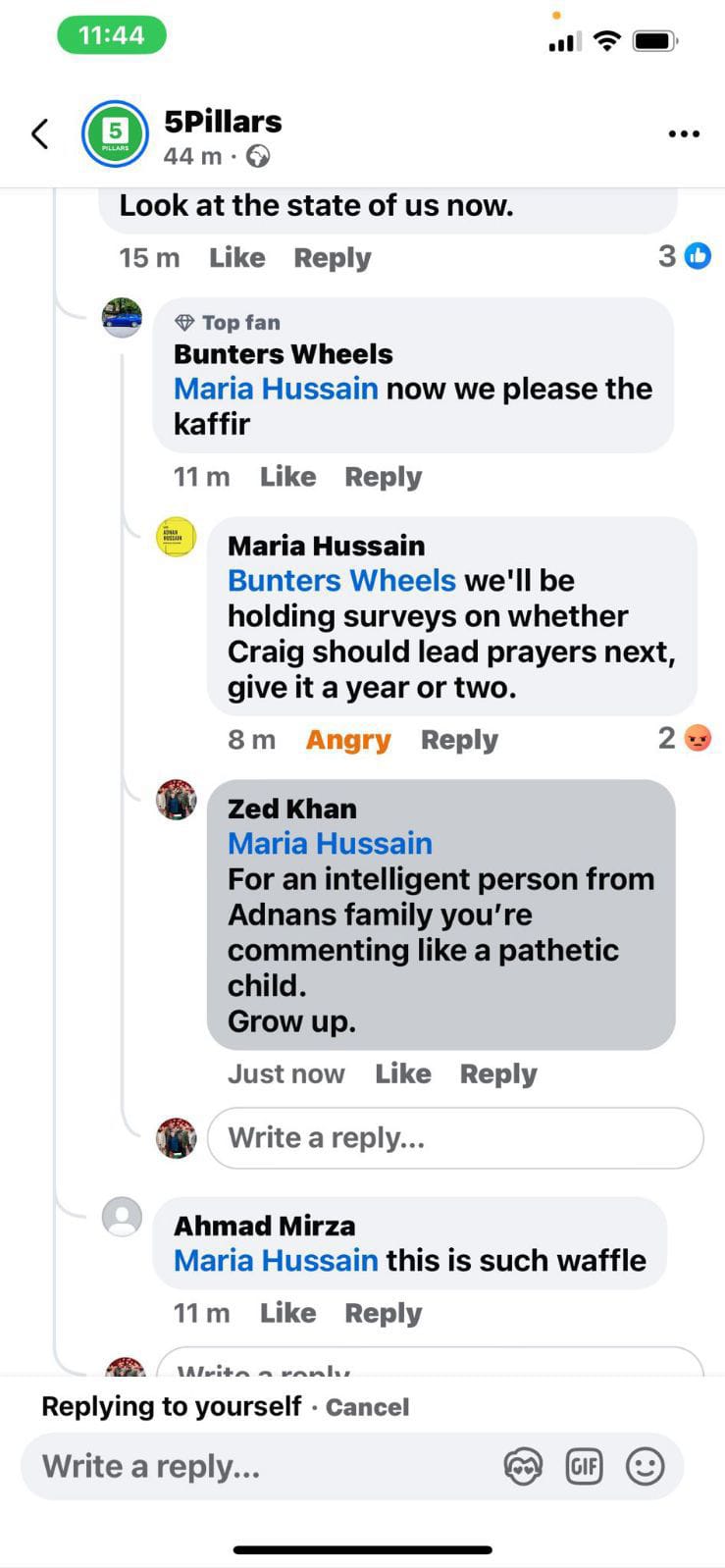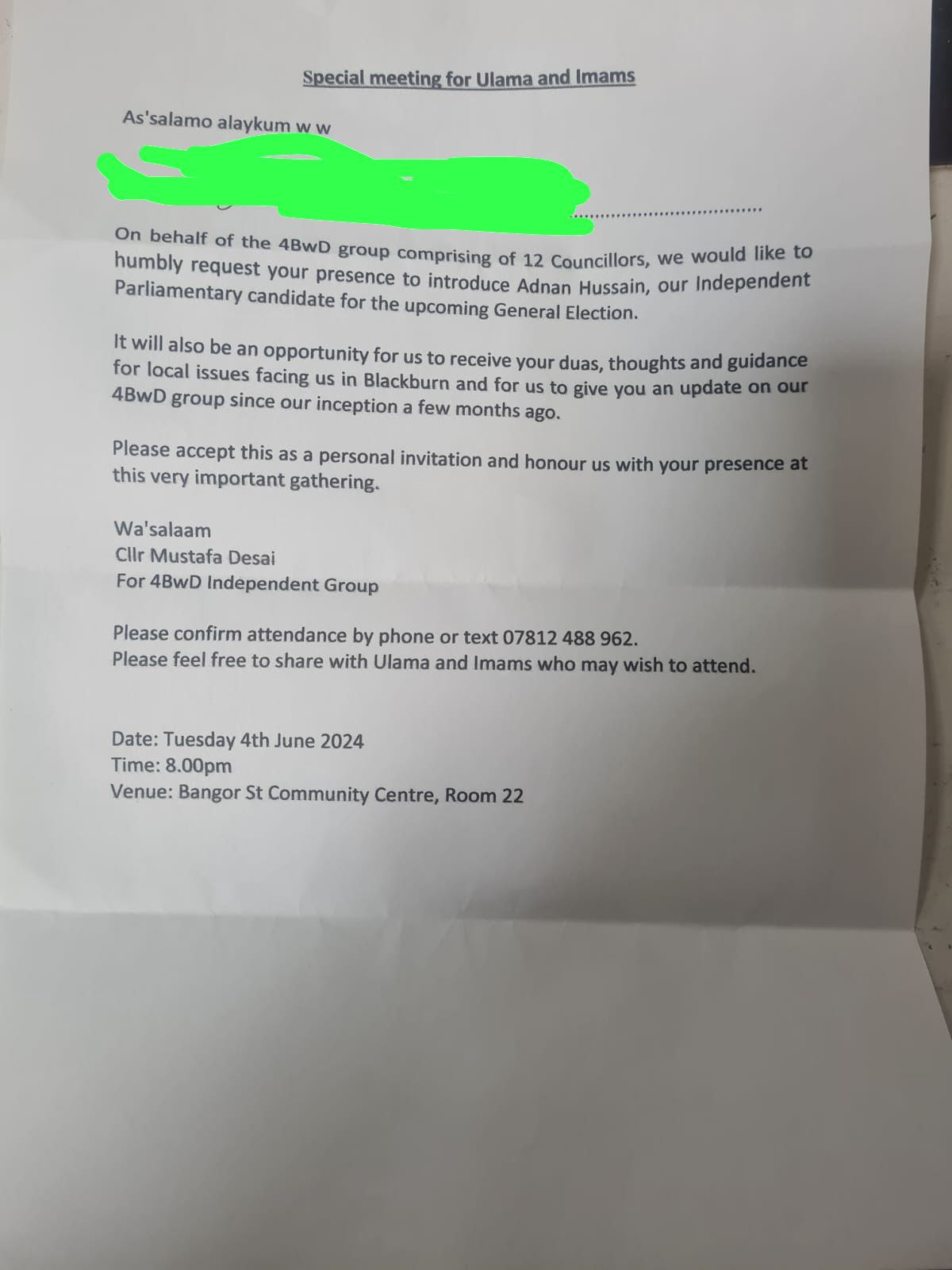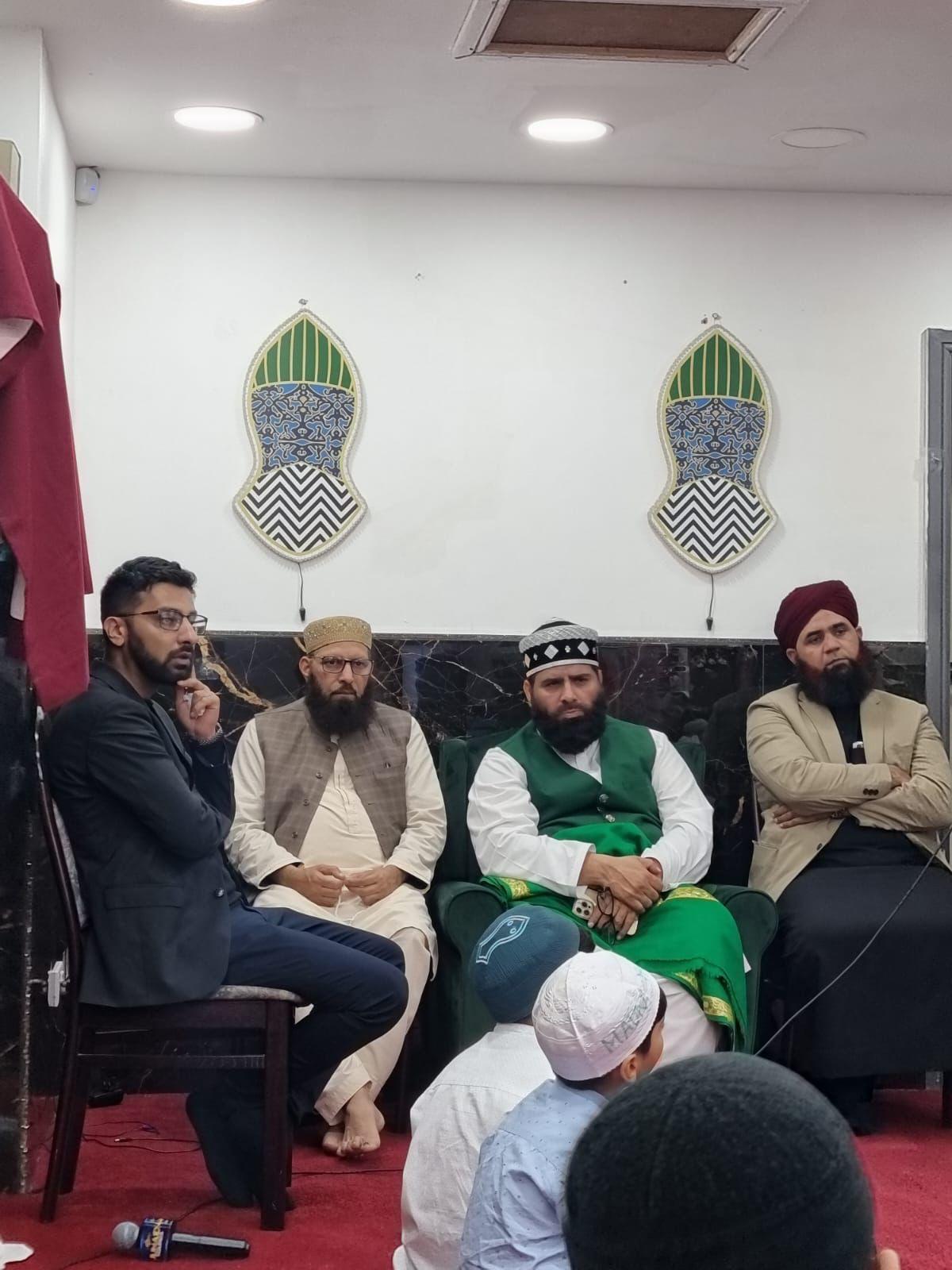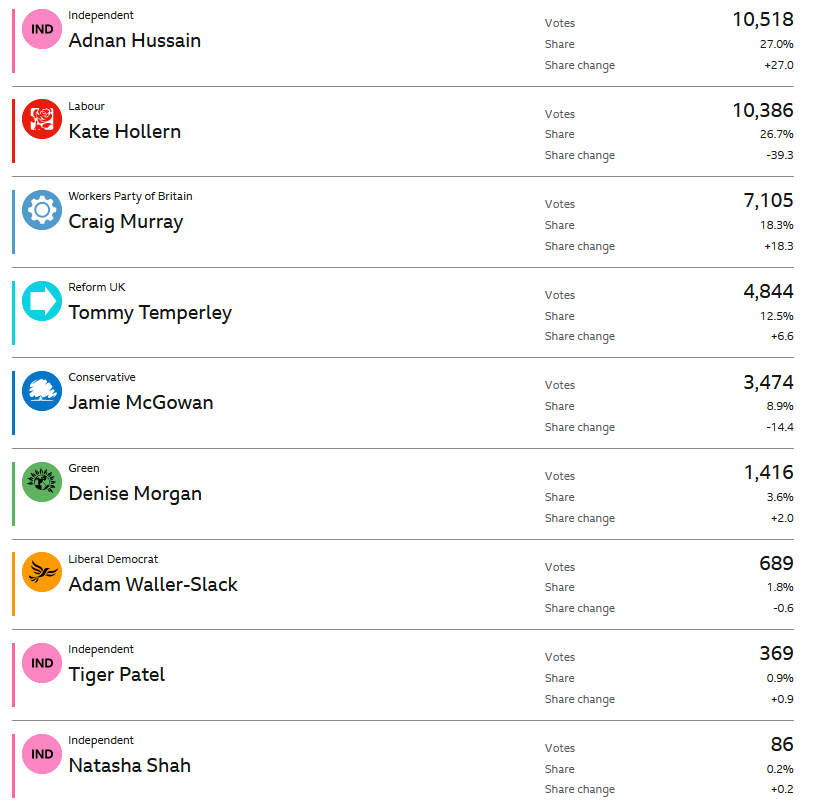The Muslim Vote 89
With Gaza genocide as the galvanising issue, in seats where Muslims are over 30% of the electorate, Labour’s vote share plunged from 65% in 2019 to 36% at the 2024 general election.
In Blackburn, where I stood, Labour’s vote share dived incredibly, from 65% to 27%. This in a general election where Labour won a huge majority.
The strategy to stand anti-Gaza genocide candidates and show Starmer that Labour cannot, as in the past, take the support of Muslim voters for granted, was therefore a success. Four anti-genocide Independent MPs were elected, taking seats from Labour.
However, if you look beneath this headline, the situation is less celebratory for a Left/Muslim anti-war alliance than it may appear on the surface.
To look into this requires a granular look at my own experience in Blackburn that I hope you will find interesting.
In the early 2000s, the Stop the War movement was a highly successful example of a broadly Left/Muslim alliance in which I was deeply involved. It went on to oppose not only the war in Iraq and Afghanistan but also the wave of officially inspired Islamophobia and the attacks on civil liberty in the “War on Terror”.
This video is of me addressing a Stop the War conference on Islamophobia in 2007.
Stop the War’s work goes on and is closely linked with the pro-Palestinian movement, of which I have been a member since the 1970s and which has also been broadly a successful Left/Muslim alliance.
So what is the problem?
Well one pointer is that, of the scores of specifically anti-Gaza genocide candidates, over 20 of whom were standing in constituencies with more than 30% Muslim voters, the only 4 elected were themselves Muslim.
None of the anti-genocide non-Muslim Left candidates, myself included, were able to be elected on the basis of Muslim support.
This is not a fluke statistic, as I hope to explain.
Firstly, there is a problem for many Left candidates in fitting in with the social conservatism of Muslim communities. In Blackburn I found previous writings of mine, for example on abortion, gay rights and on legalisation of cannabis, being widely circulated and used against me.
Muslim supporters urged me to say my views had changed, but naturally I could not lie in this way.
I was also contacted by panicked supporters the day before the election over a quote from the Koran being widely circulated against me, which states:
“O believers! Do not take disbelievers as allies instead of the believers. Would you like to give Allah solid proof against yourselves?”
Sometimes this kind of attack was quite crude. I was more than once called a “Kaffir”. This example is from comments on the Facebook page of popular Muslim media 5Pillars.

Maria Hussain, who joins in, is the sister of the successful candidate, now Independent MP, Adnan Hussain, and co-ordinated his extremely effective social media campaign.
My second point is that there is a real problem with sectarianism in the UK’s Islamic communities. What I came across in Blackburn – and I believe to be a general problem promoted by British security services – is a specifically Sunni extremist sectarianism. This was used to portray me as an “Assadist”.
By focusing on anti-Assad rebels and the Syrian civil war, this Sunni sectarianism explicitly supports the US/NATO/Saudi position. It was ruthlessly used within British Muslim communities against Workers Party candidates all over the UK, on the alleged basis that the Workers Party is pro-Assad. That assertion is itself based on some alleged comments praising Assad by George Galloway, which I have never seen adequately sourced.

This position was well expressed by Dilly Hussain of 5pillars in a dialogue with Sheikh Asrar Rashid held in Blackburn during the election campaign. This link takes you to a key moment.
The entire dialogue is well worth viewing as a fascinating discussion in which Dilly Hussain puts the prevalent view of the British Sunni community, and Sheikh Rashid responds with thoughtful points with which I very largely agree.
As brief background the Syrian rebel forces – DAESH, ISIS, Al-Nusra and to a large extent the Free Syrian Army – are mostly specifically Sunni, while the Assad regime has been broadly protective of Syria’s substantial Shia, Alaouite, Christian, Jewish and other minorities.
That is extreme shorthand: many Syrian Sunnis support Assad and the original Syrian democracy movement had broad cross-communal support.
The key point however is that the positions put forward by Dilly Hussain – supporting the overthrow of Gaddafi by NATO and supporting the alliance by Syrian rebel groups with the USA against Assad – are identical to those which were being advanced against me in Blackburn by the Adnan Hussain camp, where I was consistently and quite wrongly described as pro-Assad.
The first time I ever met Adnan Hussain, at a pro-Gaza demonstration in Blackburn in April, he included in his speech support for British policy in the Ukraine against Russia. I was bewildered by this. It was only during the election campaign that I understood where it came from.
This pro-NATO aspect of Sunni sectarianism, on the basis of the Syrian civil war, is hard for a liberal mind intellectually to reconcile with what is the genuine and heartfelt opposition of these same Sunni sectarians to Western policy in Palestine. It was a real problem for the Left/Muslim alliance in this general election.
Thirdly, the place of religion in politics is itself a problem for a Left/Muslim alliance.
In Blackburn, campaigning through the religious Establishment was the central plank of Adnan Hussain’s campaign, planned and organised from the outset.

Ulama means scholars of the Islamic religion, a specific and highly trained group. Imams are clerics. The Ulama and Imams together may be taken as forming the religious establishment.
Adnan Hussain very frequently claimed that he had the endorsement of the Scholars and Imams of Blackburn, and indeed that this was the very basis on which he was standing for election. He reinforced this by social media output, often filmed or photographed within mosques or madrassas, continually reinforcing the notion his campaign had the backing of the religious Establishment. Even at his few “political” meetings he always took care to have Imams and scholars behind him.

In this meeting publicised by his campaign and within a religious building, Adnan Hussain states:
With the duas [prayers] of (name of senior cleric present), with the duas of the scholars, I am taking this stance Inshallah [Allah willing], with your support I hope that we are successful Inshallah.
I am showing you here a small fraction of this kind of social media output by the Adnan Hussain campaign, featuring religious establishment endorsement:
There is much more of this. I confess I am uncomfortable with this religious basis of campaigning. On top of which it is very definitely illegal.
Using spiritual influence in an election campaign is against the law and grounds for disqualification. It was used against Luftur Rahman in his disqualification as Mayor of Tower Hamlets in 2015.
It is however a law which is extremely difficult to enforce. Neither the Returning Officer nor the Electoral Commission have any power to intervene against the use of spiritual influence. And while it is an offence, the Electoral Commission advise the police can only act where undue spiritual pressure is brought to bear on a named individual.
The wider electoral law against spiritual influence can, the Electoral Commission say, only be activated by an electoral petition brought against the result by a defeated candidate, to be heard by an electoral court.
For the avoidance of doubt, I am not going to do this.
For one thing there is a £5,000 fee to bring the petition, plus you need to have lawyers to take it through the process who are likely to cost many times that.
But rather more importantly, I am not sure it would be right to bring a petition. The voters of Blackburn decided they prefer Adnan Hussain to me. Who am I to query their motives?
While I stated that I am not comfortable with the use of religion as a campaign platform, that is not to say that I agree that it should be illegal to do so. I am in two minds on the subject. I have always felt the disqualification of Rahman was unfair.
The law against spiritual influence in elections was introduced in the 19th century specifically to stop the Catholic church hierarchy in Ireland from instructing people to vote for Irish nationalists.
While I do favour the separation of the state from religion, and worry about the ability of religious hierarchies to exercise control over their followers which in some instances may be unhealthy, I am not certain that I agree the state should be able to dictate to people the criteria by which they should vote.
In short, if Muslims wish to vote for somebody because they are Muslim, or even because their religious hierarchy tells them to do so, is it not their right to vote as they wish?
There is however one aspect of this whole experience which does concern me. Blackburn remains an extremely segregated town, to a degree it is hard to believe if you have not experienced it. There are whole wards which are well over 95% Muslim or over 95% non-Muslim. There are state schools which are 98% Muslim or 98% non-Muslim.
I held 5 public meetings during my election campaign, and attendance at every one was roughly 50% Muslim and non-Muslim.
Contrast that to attendance at Adnan Hussain’s meetings. He held two public meetings I know of, and this the second is identical in composition to the first, i.e. frighteningly ethnically homogeneous.
It is of course natural that a campaign which is heavily based on religion will not attract those not of that religion. Hussain’s campaign tried to state that they had significant support in non-Muslim areas, highlighting in particular his personal friendship with a popular mixed martial arts fighter, but I can tell you for certain this is empty.
At the count you can see the ballot boxes from different polling stations counted, and I have no doubt whatsoever that Hussain’s total of 10,518 votes contained an absolute maximum of 500 non-Muslim votes, and probably a great deal less than that.
In a community as tragically divided as Blackburn, the effects of an MP being elected by only one section, across a divide that to some individuals is sadly bitter, can only be unhelpful.
I realise this is probably more information than you wanted to know about Blackburn and its politics. But I believe that those insights can be more widely applied to the electoral fate of the Left/Muslim alliance on Gaza.
I also think an account of what happened was owing to the readers of this blog, who after all financed my campaign through crowdfunding. For which I am, as ever, extremely grateful.

————————————————
Forgive me for pointing out that my ability to provide this coverage is entirely dependent on your kind voluntary subscriptions which keep this blog going. This post is free for anybody to reproduce or republish, including in translation. You are still very welcome to read without subscribing.
Unlike our adversaries including the Integrity Initiative, the 77th Brigade, Bellingcat, the Atlantic Council and hundreds of other warmongering propaganda operations, this blog has no source of state, corporate or institutional finance whatsoever. It runs entirely on voluntary subscriptions from its readers – many of whom do not necessarily agree with every article, but welcome the alternative voice, insider information and debate.
Subscriptions to keep this blog going are gratefully received.
Choose subscription amount from dropdown box:
PayPal address for one-off donations: [email protected]
Alternatively by bank transfer or standing order:
Account name
MURRAY CJ
Account number 3 2 1 5 0 9 6 2
Sort code 6 0 – 4 0 – 0 5
IBAN GB98NWBK60400532150962
BIC NWBKGB2L
Bank address Natwest, PO Box 414, 38 Strand, London, WC2H 5JB
Bitcoin: bc1q3sdm60rshynxtvfnkhhqjn83vk3e3nyw78cjx9
Ethereum/ERC-20: 0x764a6054783e86C321Cb8208442477d24834861a